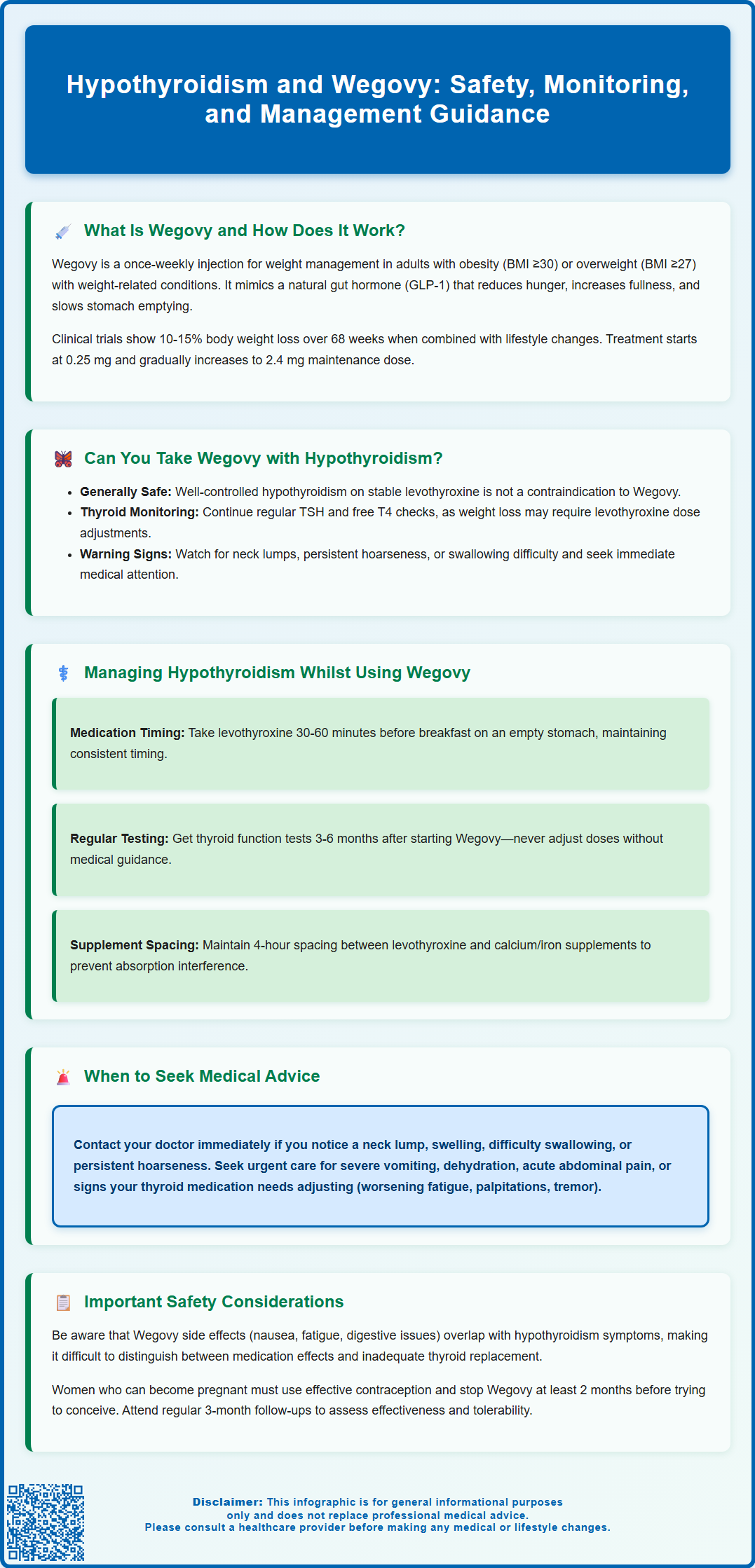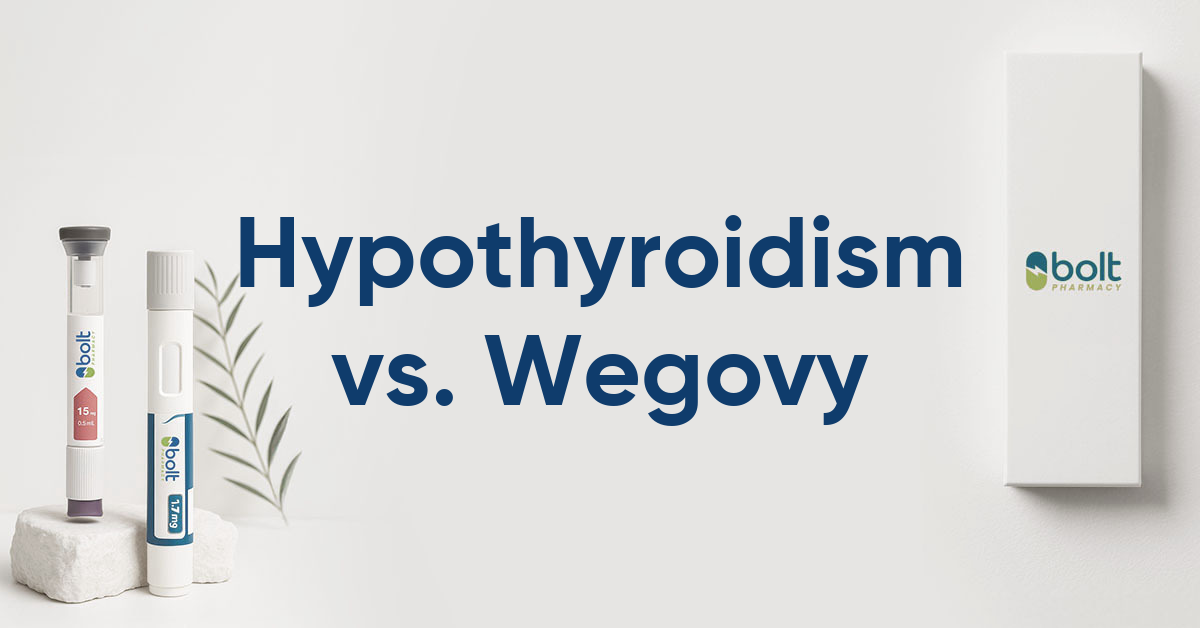Hypothyroidism and Wegovy can be safely combined in most cases, provided your thyroid condition is well-controlled with levothyroxine. Wegovy (semaglutide 2.4 mg) is a once-weekly injection licensed in the UK for weight management in adults with obesity or overweight with weight-related comorbidities. For individuals with an underactive thyroid on stable replacement therapy, there is generally no contraindication to using Wegovy. However, coordinated care is essential: regular thyroid function monitoring should continue, and significant weight loss may require levothyroxine dose adjustments. This article explores the safety considerations, monitoring requirements, and practical guidance for managing hypothyroidism whilst using Wegovy.
Summary: Wegovy can generally be used safely in people with well-controlled hypothyroidism on stable levothyroxine therapy, with no specific contraindication listed in UK prescribing guidance.
- Semaglutide is a GLP-1 receptor agonist administered weekly for weight management in adults with obesity or overweight with comorbidities.
- Hypothyroidism is not a contraindication to Wegovy provided thyroid function is adequately managed with levothyroxine replacement.
- Regular thyroid function monitoring should continue, typically at 3–6 months after starting Wegovy, as weight loss may alter levothyroxine requirements.
- Patients should be counselled on thyroid tumour symptoms (neck lump, persistent hoarseness, difficulty swallowing) and seek prompt medical attention if these occur.
- Coordinated care between prescribing clinician and GP ensures safe management of both conditions with appropriate monitoring and dose adjustments.
Table of Contents
What Is Wegovy and How Does It Work?
Wegovy (semaglutide 2.4 mg) is a prescription medicine licensed in the UK for weight management in adults with obesity (BMI ≥30 kg/m²) or overweight (BMI ≥27 kg/m²) with at least one weight-related comorbidity, such as type 2 diabetes, hypertension, or obstructive sleep apnoea. It is administered as a once-weekly subcutaneous injection and is intended to be used alongside a reduced-calorie diet and increased physical activity.
Semaglutide belongs to a class of medications called glucagon-like peptide-1 (GLP-1) receptor agonists. It works by mimicking the action of the naturally occurring hormone GLP-1, which is released from the gut after eating. The mechanism of action involves several pathways:
-
Appetite regulation: Semaglutide acts on receptors in the brain (particularly in the hypothalamus) to reduce hunger and increase feelings of fullness, leading to decreased calorie intake.
-
Gastric emptying: It slows the rate at which food leaves the stomach, prolonging satiety after meals.
-
Glucose control: Although primarily used for weight management at this dose, semaglutide also improves blood sugar regulation by stimulating insulin secretion when glucose levels are elevated.
Clinical trials (STEP programme) have demonstrated that Wegovy can lead to significant weight loss—typically 10–15% of initial body weight over 68 weeks—when combined with lifestyle modifications. Treatment starts with a lower dose (0.25 mg weekly), gradually increasing every 4 weeks (0.5 mg, 1.0 mg, 1.7 mg) until reaching the maintenance dose of 2.4 mg to minimise gastrointestinal side effects.
NICE guidance supports Wegovy's use within specific criteria as part of NHS specialist weight management services (Tier 3 or 4). For NHS-funded treatment, patients must have a BMI of ≥35 kg/m² (or ≥32.5 kg/m² in certain ethnic groups) with at least one weight-related comorbidity, or a BMI ≥30 kg/m² (≥27.5 kg/m² in certain ethnic groups) with at least one weight-related comorbidity and a referral to a specialist weight management service. NHS treatment is typically limited to a maximum of 2 years. Private prescriptions are also available.
Wegovy is contraindicated during pregnancy and breastfeeding. Women of childbearing potential should use effective contraception and discontinue semaglutide at least 2 months before a planned pregnancy.
Can You Take Wegovy If You Have Hypothyroidism?
Hypothyroidism—an underactive thyroid gland—is a common endocrine condition affecting approximately 2% of the UK population, with higher prevalence in women and older adults. It occurs when the thyroid produces insufficient thyroid hormones (thyroxine, T4, and triiodothyronine, T3), leading to symptoms such as fatigue, weight gain, cold intolerance, and constipation. Most cases are managed with levothyroxine replacement therapy.
For individuals with well-controlled hypothyroidism on stable levothyroxine treatment, there is generally no contraindication to using Wegovy. The UK Summary of Product Characteristics (SmPC) for semaglutide does not list hypothyroidism as a contraindication, and clinical trials included participants with thyroid disorders. Provided your thyroid function is adequately managed and thyroid-stimulating hormone (TSH) levels are within the target range, Wegovy can be considered as part of a weight management programme.
However, there are important considerations:
-
Thyroid safety: Animal studies with GLP-1 receptor agonists showed an increased risk of thyroid C-cell tumours, though the relevance to humans remains uncertain. The UK SmPC advises that patients should be counselled on symptoms of thyroid tumours (such as a lump in the neck, persistent hoarseness, difficulty swallowing) and seek prompt medical attention if these occur.
-
Pre-existing thyroid disease: The SmPC notes that thyroid adverse events, including goitre, may be more frequent in patients with pre-existing thyroid disease.
-
Thyroid monitoring: If you have hypothyroidism, your GP or endocrinologist should continue regular thyroid function monitoring (typically TSH and free T4) as per standard care, usually annually once stable or more frequently during dose adjustments.
-
Weight and thyroid function: Weight loss itself may influence levothyroxine requirements, as dosing is partly weight-dependent. Some patients may need dose adjustments during significant weight reduction.
Before starting Wegovy, discuss your thyroid history thoroughly with your prescribing clinician to ensure it is safe and appropriate for your individual circumstances. If you are planning a pregnancy, note that Wegovy should be discontinued at least 2 months before attempting to conceive.

Managing Hypothyroidism While Using Wegovy
Successfully managing hypothyroidism whilst taking Wegovy requires coordinated care and attention to both conditions. Here are key considerations for safe and effective treatment:
Thyroid hormone replacement stability: Continue taking your levothyroxine exactly as prescribed, typically on an empty stomach 30–60 minutes before breakfast. Consistency in timing and dosing is essential for maintaining stable thyroid hormone levels. While there is no direct pharmacological interaction between semaglutide and levothyroxine, Wegovy's effect on gastric emptying could potentially affect absorption of oral medications. Monitor for any changes in thyroid symptoms that might suggest adjustment is needed.
Regular monitoring: Maintain your scheduled thyroid function tests. Your GP may recommend checking TSH and free T4 levels approximately 3–6 months after starting Wegovy, then as clinically indicated. Significant weight loss can alter levothyroxine requirements—some patients need dose reductions as body weight decreases, whilst others may require adjustments for different reasons. Never alter your thyroid medication dose without medical guidance.
Managing side effects: Common adverse effects of Wegovy include:
-
Nausea, vomiting, and diarrhoea (usually transient and improving over time)
-
Constipation
-
Abdominal discomfort
-
Fatigue
Some of these symptoms overlap with hypothyroidism symptoms, which can make it challenging to distinguish between inadequate thyroid replacement and medication side effects. If you experience persistent or worsening fatigue, discuss this with your clinician—it may warrant thyroid function reassessment.
Lifestyle integration: Both conditions benefit from similar lifestyle approaches. A balanced, nutrient-dense diet supports thyroid health and weight management. Ensure adequate intake of iodine (found in dairy, fish, and eggs) and selenium (Brazil nuts, fish, eggs), which are important for thyroid hormone synthesis. Regular physical activity improves metabolic health, mood, and weight outcomes.
Medication timing: If you take calcium or iron supplements, maintain appropriate spacing from levothyroxine (typically 4 hours) to avoid absorption interference. If you take proton pump inhibitors (PPIs), be aware these may reduce levothyroxine absorption regardless of timing; your doctor may need to monitor and adjust your levothyroxine dose. Wegovy can be administered at any time of day, with or without food, on the same day each week.
For people with diabetes: If you have diabetes and pre-existing diabetic retinopathy, inform your eye care team when starting Wegovy, as rapid improvements in blood glucose control may temporarily worsen retinopathy.
When to Seek Medical Advice About Wegovy and Thyroid Health
Whilst Wegovy is generally well-tolerated in people with controlled hypothyroidism, certain symptoms warrant prompt medical attention. Contact your GP or prescribing clinician if you experience:
Thyroid-related concerns:
-
A lump or swelling in the neck, difficulty swallowing, or persistent hoarseness—these require urgent evaluation to exclude thyroid pathology. While a causal link between semaglutide and thyroid cancer in humans has not been established, these symptoms should always be assessed promptly.
-
Symptoms suggesting under-replacement of thyroid hormone: worsening fatigue, increased cold sensitivity, unexplained weight gain despite adherence to Wegovy, constipation, dry skin, or low mood.
-
Signs of over-replacement: palpitations, tremor, anxiety, heat intolerance, or unintentional weight loss beyond expected Wegovy effects.
Wegovy-related adverse effects requiring assessment:
-
Severe or persistent gastrointestinal symptoms: Whilst mild nausea is common initially, severe vomiting, inability to tolerate fluids, or signs of dehydration require medical review.
-
Acute abdominal pain, particularly if severe and radiating to the back, which could indicate pancreatitis (a rare but serious adverse effect).
-
Gallbladder problems: Rapid weight loss increases gallstone risk. Seek advice for right upper abdominal pain, particularly after eating fatty foods.
-
Hypoglycaemia symptoms (mainly if you have diabetes and take insulin or sulfonylureas): shakiness, sweating, confusion, or palpitations. Your diabetes medication doses may need adjustment.
-
Changes in mood: Although a causal link has not been established, seek medical advice promptly for any new or worsening depression or thoughts about self-harm.
Routine follow-up: Even without concerning symptoms, maintain regular appointments with your healthcare team. NICE guidance recommends reviewing weight management medication at 3-month intervals initially, assessing efficacy, tolerability, and overall health. For NHS-funded treatment, continuation criteria apply, and treatment is typically limited to a maximum of 2 years. Your prescriber should coordinate with your GP regarding thyroid monitoring to ensure integrated care.
If you have questions about whether symptoms relate to your thyroid condition, Wegovy, or another cause, err on the side of caution and seek professional advice. Early intervention can prevent complications and optimise outcomes for both weight management and thyroid health.
You can report any suspected side effects to the MHRA through the Yellow Card scheme (yellowcard.mhra.gov.uk or via the Yellow Card app).
Frequently Asked Questions
Is Wegovy safe if I have an underactive thyroid?
Yes, Wegovy is generally safe for people with well-controlled hypothyroidism on stable levothyroxine therapy. The UK prescribing information does not list hypothyroidism as a contraindication, though regular thyroid monitoring should continue and levothyroxine doses may need adjustment during weight loss.
Will Wegovy affect my levothyroxine medication?
There is no direct pharmacological interaction between semaglutide and levothyroxine. However, significant weight loss may alter levothyroxine requirements, and Wegovy's effect on gastric emptying could potentially influence absorption of oral medications, so thyroid function should be monitored regularly.
How often should I have thyroid tests whilst taking Wegovy?
Your GP may recommend checking thyroid function (TSH and free T4) approximately 3–6 months after starting Wegovy, then as clinically indicated. Continue your usual annual monitoring once stable, or more frequently if symptoms suggest your levothyroxine dose needs adjustment.
The health-related content published on this site is based on credible scientific sources and is periodically reviewed to ensure accuracy and relevance. Although we aim to reflect the most current medical knowledge, the material is meant for general education and awareness only.
The information on this site is not a substitute for professional medical advice. For any health concerns, please speak with a qualified medical professional. By using this information, you acknowledge responsibility for any decisions made and understand we are not liable for any consequences that may result.
Heading 1
Heading 2
Heading 3
Heading 4
Heading 5
Heading 6
Lorem ipsum dolor sit amet, consectetur adipiscing elit, sed do eiusmod tempor incididunt ut labore et dolore magna aliqua. Ut enim ad minim veniam, quis nostrud exercitation ullamco laboris nisi ut aliquip ex ea commodo consequat. Duis aute irure dolor in reprehenderit in voluptate velit esse cillum dolore eu fugiat nulla pariatur.
Block quote
Ordered list
- Item 1
- Item 2
- Item 3
Unordered list
- Item A
- Item B
- Item C
Bold text
Emphasis
Superscript
Subscript












